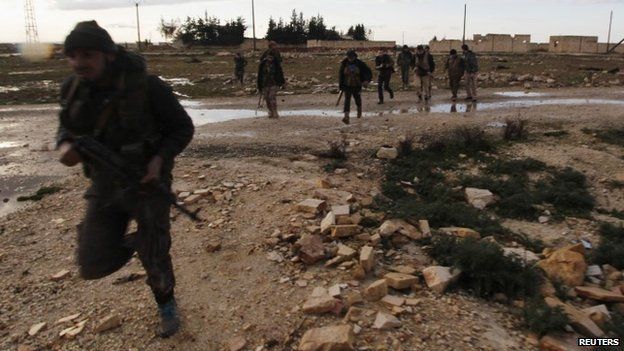Syria 'agrees to stop Aleppo strikes for six weeks'
- Published

Aleppo has been divided between rebel and government control since fighting erupted there in mid-2012
The Syrian government is prepared to suspend its aerial attacks on Aleppo for six weeks for a trial ceasefire, UN special envoy Staffan de Mistura says.
He said the pledge from Damascus offered a glimmer of hope, although it is unclear when it would take effect.
The opposition National Coalition said the government would be judged by its actions rather than words.
Government forces have been battling rebels in an effort to cut a crucial supply route north of Aleppo.
The UK-based Syrian Observatory for Human Rights reported on Wednesday that at least 150 soldiers and rebels had been killed in and around the city.
The death toll is expected to rise as 25 soldiers are still unaccounted for, it said.
The Observatory's director, Rami Abdul Rahman, said the army was controlling the main route from rebel-held north-eastern Aleppo to the Turkish border from positions it had set up in the villages of Bashkuwi and Sifat, north of the city.
There have been many civilian casualties in Aleppo since mid-2012
Much of Aleppo has been razed to the ground in the fighting
Mr de Mistura wants more humanitarian aid access to Aleppo as the first step toward a wider solution
Mr de Mistura has been working since October to negotiate local ceasefires, or "freeze zones", in the contested areas, starting with Aleppo.
During a recent visit to the country, he held a long meeting with the Syrian president, during which Bashar al-Assad apparently indicated a willingness to halt all aerial bombing and artillery shelling of Aleppo for the six-week period.
Mr de Mistura said he would return to Syria as soon as possible with the aim of announcing a freeze in the fighting in the northern city, during which opposition forces would also be expected to suspend their mortar and rocket fire.
"Let's be frank, I have no illusions because based on past experiences, this will be a difficult issue to be achieved," he said.
Analysis: Jim Muir, BBC News, Beirut
Mr de Mistura did well to stress that he had no illusions about the prospects for success. As he pointed out, talk of truces frequently spurs the combatants to try to improve their positions on the ground before the whistle blows and hostilities stop.
That was already happening in and around Aleppo, though the fighting has its own momentum and seemed to be escalating anyway, breeding even more scepticism about the prospects for a freeze.
Truces only stick if both sides see the advantage of it. The government may reckon a freeze would allow it to redeploy troops elsewhere - that is the opposition's suspicion.
But the truce would also require the motley array of rebel groups to stop their own rockets and mortars, which some may be little motivated to do.
With much of the surrounding countryside also under violent dispute, it is hard to see how the conflict can be isolated and frozen inside Aleppo city.
The aim is to spare civilians further suffering. That is laudable, but it has not been a priority for the combatants so far.
Aleppo has been divided between rebel and government control since fighting erupted in the city in mid-2012.
But soldiers, backed by pro-government militiamen and fighters from Lebanon's Hezbollah movement, have made steady advances since launching an offensive to retake the rebel-held west of the city last year.
On Monday, the pro-government al-Watan newspaper reported that government forces aimed to completely surround Aleppo this week in a major offensive against the rebels.
Analysts said then that the government's progress had reduced the chance of a local ceasefire.
On Monday, the Revolutionary Command Council - an alliance of rebel fighters that does not belong to hardline Islamist groups - accused Mr de Mistura of being "biased" and taking a "dishonest position towards the revolution of the Syrian people".
It followed comments on Friday by the UN envoy, in which he called President Assad "part of the solution for the reduction of the violence", which the UN says has killed more than 220,000 people.
Aleppo-based rebels and opposition activists have expressed concerns that the government will exploit any local truces to redeploy its forces to fight elsewhere, and have questioned how they will work with jihadist militants from the Islamic State group in Aleppo province.